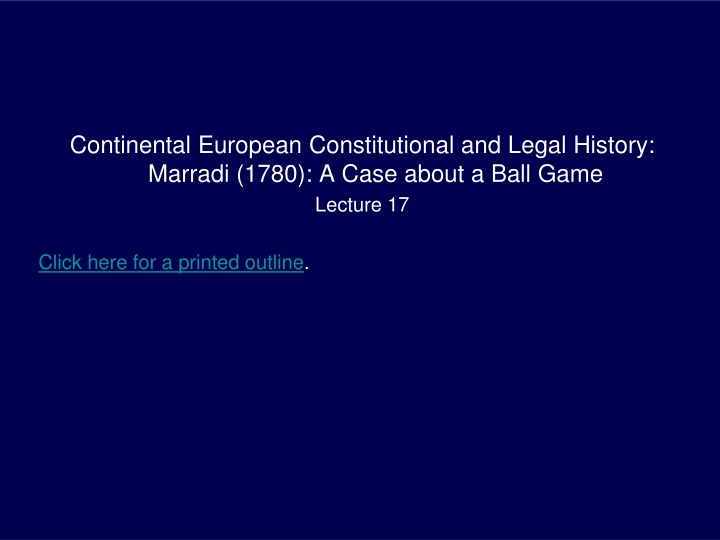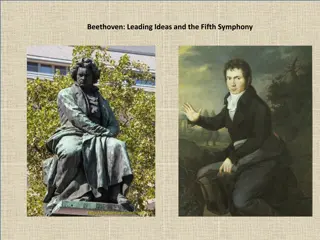
Italian Legal History: Marradi 1780 Case - Ball Game Decision
Explore the 1780 Italian legal case involving a ball game in Marradi, shedding light on the intersection of public and private interests. Dive into the analysis of this unique decision by Giuseppe Vernaccini, offering insights into customary law and societal practices of the time.
Download Presentation

Please find below an Image/Link to download the presentation.
The content on the website is provided AS IS for your information and personal use only. It may not be sold, licensed, or shared on other websites without obtaining consent from the author. If you encounter any issues during the download, it is possible that the publisher has removed the file from their server.
You are allowed to download the files provided on this website for personal or commercial use, subject to the condition that they are used lawfully. All files are the property of their respective owners.
The content on the website is provided AS IS for your information and personal use only. It may not be sold, licensed, or shared on other websites without obtaining consent from the author.
E N D
Presentation Transcript
Continental European Constitutional and Legal History: Marradi (1780): A Case about a Ball Game Lecture 17 Click here for a printed outline.
Introduction I want to begin the class with an 18th century Italian decision (1780) that closes the section on case reports (Mats. 14F). The entire section from the materials is on the outline slightly indented. What I m going to say about it is on notes that are flushed to the margin. The case involves us in some legal propositions that we haven t dealt with before, but I chose it because it has been particularly well explained by a distinguished Italian legal historian and comparative lawyer named Gino Gorla. One of the striking things about this case is that the method seems quite similar to Bartolus. The American Revolution had already taken place, but what is being said here would be have been largely comprehensible to a fourteenth-century commentator. Gino Gorla regards the decision as quite extraordinary, indeed, so extraordinary that he thinks that politics was involved. We don t have to agree with that view, but at least we should try to come to grips with his argument. In order to do that, we need to go through the decision step by step.
The statement of facts In 1780, Giuseppe Vernaccini, an auditor of the Rota Fiorentina, rendered a decision in an appeal case that had been delegated to him by the Magistrato Supremo, the highest court of the Grand Duchy of Tuscany: The case is called: Marradi Claimed Repair of Damages, and Vernaccini held that no damages were owing. I think that it is important to analyze the statement of facts. It frequently provides a clue as to judicial motivations, a clue that is not always given in the recital of the law applicable to the facts. On the slides, text in quotation marks comes from Gorla s part translation part synopsis of the case, which I have sometimes shortened: In the Tuscan town of Marradi since time immemorial, it was customary during the summer for a team of amateurs (dilettanti) to play a ball game in the public square. According to a similar usage existing in other towns of Italy, the game was played mostly as an amusement or public feast for the citizens, rather than as an athletic exercise for the local youth. The owners of houses surrounding the square never opposed the use of the area for the game. It was also customary that the team would notify the owners of the day during the summer on which the games would be commenced, in order that they might adopt measures to avoid damages to their houses, especially to the windows.
The statement of facts (contd) Hints of various possible attitudes and legal conclusions can be found in this language. Immemorial when connected with the word custom states a possible condition under which customary law can arise. (This is true in both the ius commune and in our law.) But what is the customary law that is being alleged here? For as long as anyone can remember, these folks had been playing a ball game. That was the custom of the town, but what is normative about this? Not every custom, even if immemorial, gives rise to law. The next sentences head us off in another direction. The folks that played this game weren t doing it for their own exercise, at least not principally; they were doing it for the amusement or public feast of the local citizens. So what? Well, the suggestion seems to be that we have a conflict here between public and private interests, not just a conflict between two incompatible sets of private interests. Indeed, this is done not only in Marradi, but all over Italy. Indeed, using the public square for spectacles of this variety is quite common in southern Europe. The huge public square in Siena is used for horse races, known as the pallio, every summer. In the small town of Chinch n near Madrid the public square is closed off on numerous Sundays for bull fights. Compared to that what was going on in Marradi is quite mild.
The statement of facts (contd) The owners of houses surrounding the square had never objected to this practice. Why are we being told that? The statement suggests an argument by prescription or laches, that is to say that someone has acquired a right by long usage or that someone has lost one by failing to exercise it in a timely fashion. This is something that we ll have to come back to. It was also customary that the owners of houses around the square be notified when the game was to take place, so that they could take measures to prevent any damage to their houses. The unstated conclusion that we are probably meant to draw from this statement is that all the other houses in the square were able to avoid damage during the ball game by taking some relatively minor precautions, such as shuttering the windows. (It helps to know that many Italian houses, then and now, have heavy shutters on the windows, which are used, among other things to keep the insides of the houses cool in the heat of the day, and also to allow the residents to take a nap when the day is at its hottest.)
The statement of facts (contd) Now things begin to get complicated: The team of ball-players notified the house owners that the games would commence on 24 July 1778. The Fabronis, a noble family that owned a house on the square the fa ade of which had just been restored, applied for a decree [I wouldn t use the word injunction , though Gorla does] from the seven-member magistrato communale forbidding the holding of the games or for a cautio de damno infecto[more of this in a minute]. The team, resenting the fact that one family would oppose the public games [a lot of local tension is conveyed by that phrase] claimed that the games had always been free from any liability for damages. Now this is a legal claim, a claim of customary law. As such, it is probably way too broad. Surely, there would be liability if a player deliberately threw a ball at an unshuttered window. The magistrato issued two decrees: (1) that it would not forbid the holding of the games; it would not forbid licit activity, and (2) there was no other convenient place to hold the games. It refused, however, to rule on the question of liability, referring that to the ordinary course of justice. .
The statement of facts (contd) A word should be said about the magistrato. It seems to operate something like a city council, but it was more judicial than that, because appeals can be taken from its decisions. Vernaccini makes quite a bit of the fact that no appeal was taken. Hence, the decision of the magistrato is res judicata or, at least, the law of the case. But the Fabronis did bring a case to the ordinary course of justice, the local vicario, for a cautio de damno infecto and (and it s hard to see how this is not the same thing) for damages that might be caused by the ball game. .
The motivations Let s move on to what s called the motivations . To do this we need to know something about the legal background. We have already said that the formal Roman law of delicts is odd, and in many ways deficient when compared to our tort law, or the modern Continental law of wrongs. Among other things, Roman law has no category that corresponds to our law of nuisance. (The absence of a category may be an advantage rather than a hindrance if we consider the mess that is our law of nuisance.) Here we have a case that calls for what we would call the law of nuisance, and it s interesting to see how these guys make it work. The best way to do that is to turn to the legal motivations that Vernaccini offers.
The motivations (contd) Basically there are four issues: (1) Liability under the lex Aquilia (the Roman statute that was the basis of most, but not all, actions for damage to property). (2) Liability for licit as opposed to illicit activities. (3) Liability under the cautio de damno infecto, the action that the Fabronis had originally brought. (4) Liability under the Roman law of servitudes, roughly equivalent to our easements. The motivation labelled (1) on the outline gives a statement of the law under the lex Aquilia. The statement is basically correct. There is no liability under the lex Aquilia unless either dolus (intentionally causing harm) or culpa (roughly, negligence) can be found. Culpa is as difficult a word in Roman law as is our negligence. It is sometimes contrasted with casus (accident). It is sometimes said to rest on foresight (quod provideri poterit), and, as in our law, there is an issue about how far back the foresight has to go. Title 2 of book 9 of the Digest has wonderful collection of material on Aquilian liability, and, as in our law, a lot turns on the facts of the cases. I give here both Digest 9.2.7.4 and Digest 9.2.11pr, both of which Vernaccini cites:
The motivations (contd) [9.2.7.4] If one kills another in wrestling or in the pancratium, or in a sparring match, or in any public exhibition, there is no Aquilian liability, since the damage seems to be committed in the cause of honor and valor, not wrongfully (iniuria, a key word in the statute). But this does not hold in the case of a slave, since only freemen are accustomed so to contest; it does hold if a filius familias is wounded. Obviously the Aquilian action will lie if the plaintiff is wounded after he has given in, or if a slave not a party to the contest has been killed, but there is no action if his master has entered the slave in a private match. If anything, this cuts the other way, because it makes clear that the absolution from liability depends on what we would call assumption of risk. The person who voluntarily enters into a boxing match takes the risk that he may get killed. But the Fabronis were not playing the ball game; indeed, they objected to its taking place. The question, if we put it in terms of assumption of risk, is whether we can push the assumption back to the point where the Fabronis decided to refurbish the fa ade of their building in the summer rather than waiting for the autumn.
The motivations (contd) [9.2.11pr] Mela gives another case: if a ball game was going on and a player hitting the ball knocked it against the hand of a barber so that the throat of the slave being shaved by the barber was cut by the razor, whoever of them was negligent will be held under the lex Aquilia. Proculus holds that the barber was at fault; and truly, if he was doing business near a place usually devoted to sport or where there was heavy traffic, he is partly responsible; but there is much to be said for the view that he who engages as a barber one who has set up his stool in a dangerous place has only himself to blame. This is a bit closer. The key to the case, in my view, is that the activity of both the barber and the ball-players takes place in the public square. I cannot imagine that the same result would have been reached if the barber had been in his barber shop and the ball came in through the window, though I must confess that I cannot think of a Roman authority directly on point.
The motivations (contd) Motivations (2) (7) deal with the second issue, and they are odd. I think that Gorla has them right. It would seem that the Italian doctors of the ius commune made up lists of licit and illicit activities. One of the purposes of these lists was for purposes of determining liability. If one was engaged in an illicit activity, then the actor was absolutely liable for any damage that resulted. It seems pretty clear that this ball game was on the list for licit activity. Hence, no absolute liability. It also seems clear that because this is a licit activity it was within the discretion of the magistrato to say where it should take place. (They probably would have had no authority authorize an illicit activity.) The problem, of course, is that Vernaccini s conclusion (that because the activity is licit and authorized in this place, there is therefore no liability) does not follow, and I think he knew that because he goes on at some length after he has made that statement.
The motivations (contd) That brings us, then, to motivations (8)-(13), the third issue, and the cautio de damno infecto. In Roman law the cautio de damno infecto was a proceeding brought before the praetor for security (cautio) for damage not [yet] done (de damno infecto), when a landowner feared that building works being conducted on a neighbor s property might damage his own property. The cautio in Roman law was a formal contract (stipulatio) to pay the damages that the building neighbor had to enter into. The purpose of the proceeding is a bit unclear from the surviving sources, but it would seem to convert a potential delictual liability into a contractual one. As a result, the building neighbor was probably strictly liable for any damage that his activity caused. Now Gorla is certainly right that the way that this worked in 18th century Italy was different from the way it worked in Rome. (There was no formal contract; instead someone stood surety for the folks who were conducting the ball game, but the result was the same as in the classical law.) Gorla is also right that there is, so far as I know, no authority in Roman law for giving the cautio when the potentially damaging activity is not being engaged in by another property owner. (cont d on next slide)
The motivations (contd) But the big question about the cautio, which Gorla doesn t really answer, is whether the Roman sources in any way support Vernaccini s various holdings that one who gives the cautiois liable only in the case of new and unusual work and not pre-existing and usual work, or, in later place, that it deals only with extrinsic and accidental effects of the work as opposed to natural and intrinsic defects of it. (I realize that Vernaccini cites decisional law on this topic, and I haven t been able to get into that, but I have taken a look at what the basic Roman texts on the topic say.) A few years ago, a student in this course wrote a paper on this case and came up with the following text from Digest 39.2.43pr, which both she and I think is the likely source of Vernaccini s distinction: A certain man promised indemnity against threatened injury to his neighbor. Tiles from his building were thrown by the wind upon those of his neighbor and broke them. The question arose whether any damages were to be paid. [Alfenus Varus] answered was that this should be done if what happened resulted from any defect or weakness of the building, but if the force of the wind was such that it could shake even a strong building, no payment could be collected. And even though it were provided in the stipulation that damages would be payable if anything should fall on it , nothing would be considered to have fallen, where anything was thrown down either by the force of the wind, or by any other external force, but only what collapses for intrinsic reasons.
The motivations (contd) While it seems clear that this passage is at least one of the sources of the distinction that Vernaccini draws, he fails to note that the passage deals with an act of God. You can t sue God; you can sue the ball-players.
The motivations (contd) Mixed in with this material is the fourth issue, the material on servitudes. Digest 8.5.8.5 is cited twice in course of these discussions. It s a wonderful case; we ought to take a look at it: Aristo, in an opinion given to Cerellius Vitalis states, that he does not think that smoke can lawfully be discharged from a cheese-factory upon buildings situated above it, unless a servitude of this kind is imposed upon said buildings; and this is admitted. He also says that it is not legal to discharge water or anything else from an upper on to a lower building, as the party has only the right to perform such acts on his own premises as will not discharge anything upon those of another, and there can be a discharge of smoke as well as of water; hence the owner of the higher building can bring suit against the owner of the lower and allege that the latter had no right to do this. He says, in conclusion, that Alfenus holds that an action can be brought in which it is alleged that a party has no right to cut stone on his own ground in such a way as to allow the pieces to fall on my premises. (cont d on next slide)
The motivations (contd) Hence Aristo says that a man who rented a cheese-factory from the people of Mintern could be prevented by the owner of a house above it from discharging smoke, but the people of Mintern would be liable on the lease; and he also says that the allegation which he can make in his suit against the party who discharges the smoke is that he has no right to do so. . . . The most notable thing about this case, of course, is that it comes out the other way. The owner of the cheese-factory is liable for the indirect harm caused by the smoke, unless he has obtained a servitude to discharge the smoke.
Conclusions As Gorla points out, the result of the case is to impose a servitude on the owners of property in the public square. This is odd because servitudes are normally regarded in the civil law as having to arise from the volition of the land owner (they normally cannot be prescribed) and because they must be for the benefit of the adjacent property not for the benefit of an individual. The result is also quite startling, as Gorla also points out, when viewed in the light of modern Italian law. Today the ball game would be regarded as a dangerous activity. As such the burden would be on the doer to show that he had taken all suitable measures to prevent this from happening. I think the same would be reached in Anglo-American law under the principle of a case known as Rylands v. Fletcher, at least in those jurisdictions that have a tendency to read that case broadly.
Conclusions Gorla gives us a nice account of both the legal and the historical background. I m inclined to think that may be right when he says that the result that Vernaccini reaches is a desired one, to appease the lower and middle classes at the expense of the nobility. As Gorla points out Vernaccini was working for the grand duke of Tuscany. But the main point, as already noted at the end of the last lecture and the beginning of this one, is how little has changed. There s not much here that would surprise Bartolus, though the world had changed a great deal since his time.



